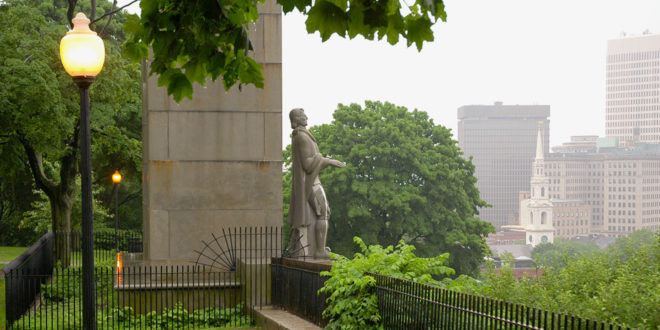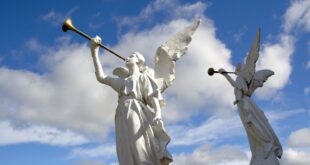Christian reformers generally claimed liberty for their own beliefs, only to deny freedom to others. But, with the Mennonites and Separatists, Baptists promoted true religious freedom. In 1614 they declared, “The magistrate is not by virtue of his office to meddle with religion, this or that form of religion, or doctrine; but to leave Christian religion free, to every man’s conscience, and to handle only civil transgressions.”
Humble Origins
Meanwhile a boy grew up in London, close by Smithfield plaza, where heretics were burned. That boy was Roger Williams, and his hobby was shorthand. He attended a court called the Star Chamber, recorded the speeches, and transcribed them for Sir Edward Coke. Impressed, Coke made Williams his secretary, and enrolled him in the Charter House school, from which he passed to Cambridge University.
In 1630 a certain Dr. Leighton became a Puritan, seeking to reform the Church of England. But the Church was not eager for reform. For his beliefs, Leighton was whipped and placed in the pillory. One of his ears was cut off, and one side of his nose split. Then he was branded on the face with the letters “SS” for “Sower of Sedition,” and returned to prison. Later to balance things, he was returned to the pillory, the other side of his nose split and his other ear cut off. Then he was imprisoned for the rest of his life.
As witness to these events, Roger Williams concluded that England was not ripe for reform. Meanwhile, Puritans had started a colony on the far side of the ocean, at a place called Massachusetts. When the 28-year-old Williams was called to serve as pastor of the church in Salem, he was happy to go. On his way there, he was invited to preach in Boston, but got into immediate trouble. He thought people should be free to worship God as they chose, or chose not, without fear of punishment by their government. This made him a heretic. He also thought Indians should be paid for their land. This made him a threat to civilized society.
The Puritans of Boston warned the church in Salem, surprised they would employ such a radical. But Salem’s leaders were tired of being dominated by Boston, and delighted to welcome Mr. Williams. The Bostonians didn’t give up. In six months they had stirred up so much trouble that Williams left Salem for refuge with the Pilgrims at Plymouth. There he enjoyed two years of relative peace, serving as assistant pastor to Elder Smith. Meanwhile he did missionary work among the Indians, became well acquainted with Chief Massasoit, and arranged a friendly treaty with him.
Intolerance in Boston
In 1633 he was welcomed back to Salem. But the Bostonians believed they were “the divine church order established in the wilderness.” Williams preached “there was never civil state in the world that ever did or ever shall make good work of it, with a civil sword in spiritual matters.” The Bostonians labeled him “the first rebel against the divine church order.”
King Darius had once signed a law for the Medes and Persians, not realizing it was aimed at Daniel. Now Boston authorities made a law aimed squarely at Williams: Everyone must swear an oath affirming “the right of magistrates to punish… and to rule in religion.” Williams was convicted of holding “dangerous opinions,” and was sentenced in these words:
“Mr. Roger Williams…hath broached and divulged diverse new and dangerous opinions against the authority of magistrates…and churches…and yet maintaineth the same without retraction: it is therefore ordered that the same Mr. Williams shall depart out of this jurisdiction within six weeks…not to return any more without license from the court.
But during his last six weeks Williams continued to preach religious liberty. Alarmed by free speech, Governor Haynes canceled Williams’ period of grace. January 11, 1636 he ordered Captain Underhill, with the aid of fourteen soldiers, to kidnap Williams in the middle of the night, and ship him back to England, where he could trouble them no more.
Fortunately before his secret arrest, Williams received a secret tip. At midnight he bade good-bye to his wife and newborn child, and through a blowing snowstorm, vanished into the wilderness.
He later wrote, “I was unmercifully driven from my chamber to a winter’s flight, exposed to the miseries, poverties, necessities, wants, debts, hardships of sea and land in a banished condition…I was sorely tossed for…fourteen weeks in a bitter winter season, not knowing what bread and bed did mean.”
Providence, a religious refuge
Emerging from the forest at Narragansett Bay, he was sheltered by Massasoit and other friendly Indians. Hearing he was safe, other persecuted souls joined the Indians. Massasoit sold them land on the Mooshassuc River. Grateful to God, Williams named their new settlement “Providence.” We still call it Providence, Rhode Island.
Williams learned well the language of his hosts, and compiled a Narragansett dictionary. Several times he served as peacemaker among the Indians; once he even protected Massachusetts Bay.
Later Governor Endicott invited Williams to return to Massachusetts, but Williams replied, “I feel safer down here among the Christian savages along Narragansett Bay than I do among the savage Christians of Massachusetts Bay Colony.”
In fact, the leaders of Massachusetts still had no interest in religious liberty. In 1644 they declared, “It is ordered and agreed, that if any person or persons, within this jurisdiction, shall either openly condemn or oppose the baptizing of infants, or seduce others, or leave the congregation during the administration of this rite, they shall be sentenced to banishment.”
This meant that Baptists had to leave Massachusetts, but they found welcome refuge in Rhode Island. Thus came Stephen and Anne Mumford in 1664. The Mumfords worshiped with other Baptists on Sunday, but they also kept holy the seventh day Sabbath. The next year came Tacy and Samuel Hubbard, who joined the Mumfords for Sabbath worship in their home. Their numbers increased, and in 1671 they organized the first Sabbath-keeping church in North America.
Roger Williams served as the first pastor of the first Baptist church of Providence. Williams did not keep the Sabbath, but he honored and protected those who did. A British major named Mason heard that the Rhode Island colony no longer kept “the Sabbath,” meaning Sunday. Williams assured Mason that Sunday was still observed, but added, “You know yourselves do not keep the Sabbath, that is the 7th day.” As long as he lived, there was never a Sunday law in Rhode Island; in fact one Seventh Day Baptist eventually became governor of the colony.
Debating Puritans on forced contributions for ministers: Williams was asked, “Is not the laborer worthy of his hire?” He answered, “Yes, from them that hire him, from the church.”
Religious Liberty for All
Williams taught that religious liberty is for everybody, including non-believers. He preached, “Persons may with less sin be forced to marry whom they cannot love, than to worship when they cannot believe.”
Some Baptists eventually moved to Virginia, only to meet persecution there. Yet even in suffering they drew great minds to their issues. Among those who defended Virginia’s Baptists were James Madison and Thomas Jefferson. The same Jefferson would later write the Declaration of Independence, and Madison would write the American Constitution.
In 1787 twelve states accepted the constitution; one did not. The one hold-out was the smallest and weakest of them all, Rhode Island; and the issue was religious liberty.
The Rhode Island delegation pled, “That religion, or the duty which we owe to our Creator, and the manner of discharging it, can be directed only by reason and conviction, and not by force or violence, and therefore all men have an equal, natural, and unalienable right to the free exercise of religion, according to the dictates of conscience, and that no particular religious sect or society ought to be favored, or established by law in preference to others.”
For three years the national union remained incomplete and without a constitution. Then Thomas Jefferson spoke to the delegates in support of Rhode Island: “By the Constitution you have made, you have protected the government from the people, but what have you done to protect the people from the government?” President George Washington recommended a bill of rights, and James Madison guided it through Congress. Supported by Virginia, Rhode Island was finally heard, the Bill of Rights was adopted, the union was complete.
Roger Williams’ influence lives on in the first words of the first amendment to the American Constitution: “Congress shall make no law respecting an establishment of religion, or prohibiting the free exercise thereof…”
Read: Why Religion & Politics Don’t Mix
Bibliography:
Cross, F. L., & Livingstone, E. A., eds., The Oxford Dictionary of the Christian Church, p. 1488, Oxford University Press, New York, 1990.
Froom, Le Roy, The Prophetic Faith of Our Fathers, vol. III pp. 46-55, Review and Herald, Washington, D.C., 1946.
Longacre, Charles, Roger Williams, Review and Herald, Washington, D.C., 1939.
Seventh Day Baptist sources from http://www.biblestudy.org.
The New Encyclopedia Britannica, 15th edition, vol. 3 p. 573, Chicago, 1991.
The New Encyclopedia Britannica, 15th edition, vol. 12 pp. 680, 681, Chicago, 1991.
The World Book Encyclopedia, vol. 21 pp. 260, 261, World Book–Childcraft International, Chicago, 1978.
White, E. G., The Great Controversy, pp. 293-297, Pacific Press Publishing Association, Boise, Idaho, 1950.
 Answers for Me Support & encouragement for every-day life
Answers for Me Support & encouragement for every-day life



